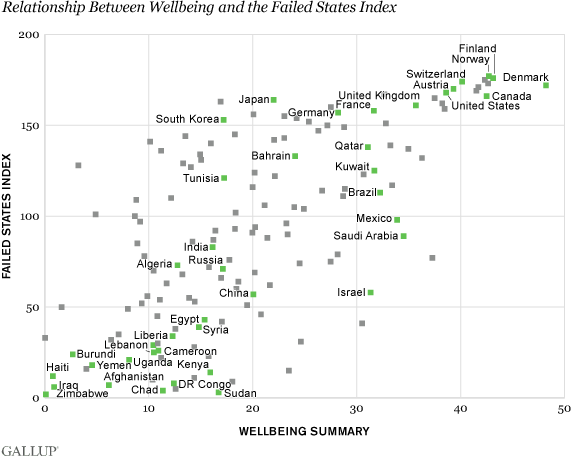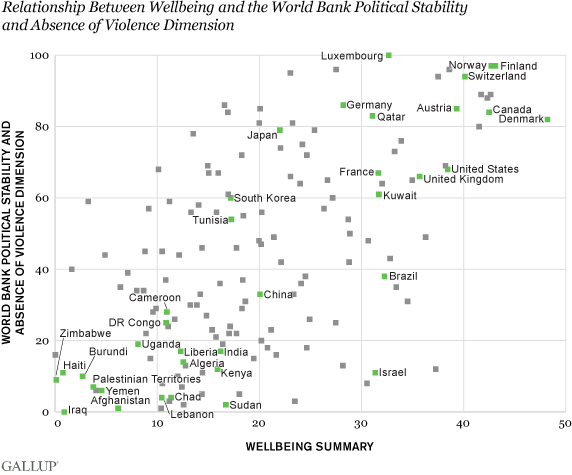WASHINGTON, D.C. -- As leaders including the Dalai Lama gather in Newark, N.J., to discuss ways to cultivate peace-building, a new Gallup analysis finds countries with the highest well-being tend to be the most peaceful countries in the world and those with the lowest well-being are the least likely to be peaceful. Gallup's life evaluation measure, which gauges well-being, correlates strongly with the Failed States Index and the World Bank's Political Stability and Absence of Violence dimension, suggesting a clear linear relationship between peace and high well-being.


These two important and complex ideas -- well-being and peace -- are often considered difficult to measure or to quantify. Gallup tackles the former by collecting well-being data in more than 150 countries. While Gallup's measures cover many elements vital to high well-being, the life evaluation component based on the Cantril Self-Anchoring Striving Scale has emerged as a powerful summary measure of overall well-being.
The Failed States Index and the World Bank attempt to tackle the latter by developing sophisticated measures of stability. The Failed States Index measures countries on social, economic, and political indicators and draws its data from English-language news reports. The Political Stability and Absence of Violence dimension, according to the World Bank, "captures perceptions of the likelihood that the government will be destabilized or overthrown by unconstitutional or violent means, including politically motivated violence and terrorism."
The data are clear: Where there is high well-being, there is peace, and where well-being wanes, there is potential for conflict, for instability, and for violence, and peace is threatened.
Switzerland, Austria, Finland, Denmark, and Norway are among the high well-being countries that also have scores that indicate they are stable, peaceful countries according to the Failed States Index and World Bank dimension. These are undoubtedly among the most stable, peaceful countries on the planet.
On the other hand, Zimbabwe, Afghanistan, Burundi, Haiti, Iraq, the Democratic Republic of the Congo, and Ivory Coast are countries that have low well-being and low peace/stability scores.
Gallup observes a relationship between well-being and real-world situations. Most notably, well-being in Egypt and Tunisia declined in the years leading up to the recent revolutions there. Similar patterns are evident in other countries in the Middle East and North Africa, including Bahrain.
Implications
Based on these findings, it is fair to ask: Can we have peace if we can achieve high well-being? Or, can we have high well-being if we achieve peace? Peace is elusive, and the path that leads to it is complicated and hard to define and understand. Gallup researchers and others worldwide are unearthing the keys to good well-being. While it is not certain, it appears possible that efforts to enhance the well-being of a citizenry may ultimately foster peace.
Glenn Phelps contributed to this report.
For complete data sets or custom research from the more than 150 countries Gallup continually surveys, please contact SocialandEconomicAnalysis@gallup.com or call 202.715.3030.
Survey Methods
Results are based on telephone and face-to-face interviews with approximately 1,000 adults in each country, aged 15 and older, conducted in 2006, 2007, 2008, and 2009 in more than 150 countries. Almost all countries had at least two years of data and most had three or more. For results based on the total sample of national adults, one can say with 95% confidence that the maximum margin of sampling error ranged from a low of ±1 percentage point in those countries with sample sizes of 3,000 or more to a high of ±3 percentage points in those countries with sample sizes of 1,000.
For more complete methodology and specific survey dates, please review Gallup's Country Data Set details.
